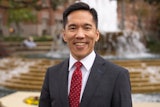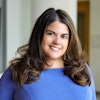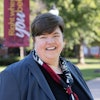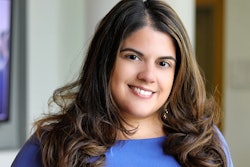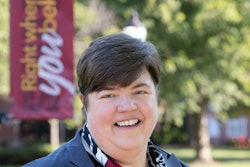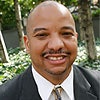 IDEAL leader Tchet Dorman is a facilitator of the monthly meeting.
IDEAL leader Tchet Dorman is a facilitator of the monthly meeting.The attendees are as diverse as the topic. There’s the professor of French, whose journey from a village in Trinidad shocks even his students. There’s the theater professor whose college experience was a lesson in segregation. And then there’s the sociology/psychology adjunct who looks back at her childhood as “stifling homogeneous.”
“Can we talk? Teaching About Race and Diversity,” is a monthly meeting of Temple University faculty and administrators hosted by the the Office of Institutional Diversity, Equity, Advocacy and Leadership (IDEAL) and the Teaching and Learning Center (TLC).
The meeting is the brainchild of Tchet Dorman, director of IDEAL. Pamela Barnett, director of TLC, had just completed the Diversity Certificate program when Dorman presented the idea of a series. The idea was a natural fit for Barnett, who had taught English and African-American studies at the University of South Carolina and worked in diversity education at Princeton University. Barnett teamed with Donna Marie Peters, assistant professor of sociology, to form the workshops. Three years later, a group is still going strong.
There are about a dozen voices in the January meeting, all surprisingly candid and apologetically passionate. White professors are the minority in this setting. Nearly all of the attendees teach a Race and Diversity class (a core General Education requirement for all undergraduates), but it isn’t requirement to attend. Any faculty or staff member of the university is welcome to chime in. While the mission is to tackle issues of race and diversity as it relates to the student body, the meetings appear more therapeutic than academic. All of them take away a bit of self-awareness. They are respectful and kind. A mention of problem students draws laughter; a question about mandatory diversity training solicits quiet reflection.
No subject is taboo, no discussion interrupted. According to Barnett, there have been heated exchanges, but everyone operates under the comfort of confidentiality. The group has “done very good at building trust. It gives people a little bit of courage” to express their feeling on a matter.
Topics range from addressing how faculty is perceived by students to helping students navigate a culturally diverse environment.
Associate professor Lee Richardson, who was raised in an integrated community in New Jersey in the 1950s and 1960s, experienced culture shock when he attended Rutgers University-New Brunswick and found only a handful of Blacks on campus. Fast forward to Temple’s campus, where the acting and directing classes he teaches are predominantly White, and Richardson said the shift in dynamic has many more factors than race.
“Millennium babies are not about to expose themselves,” said Richardson, adding that they often resist the creative process that requires them to show more than what is on the outside.
While Richardson’s introduction to culture shock was external, Mary Stricker’s was inside the home. An associate professor of sociology and one of few White women in attendance, Stricker says teaching made her feel alive, but moreso, “I didn’t want anyone else to grow up like I did.”
Her experience in the classroom has been different than Richardson’s. Stricker’s students want to share, even in attempts to prove racism doesn’t exist anymore.
Kimmika Williams-Witherspoon, associate professor of theater, is adamant about giving minority students the tools to operate in “White spaces” and concerned about the danger of ignoring the “isms: racism, ageism, among them.” For Witherspoon every moment is a teaching moment, even among her peers.
Professor Wilbert Roget doesn’t teach any of the diversity classes, but finds “so much value in the discussion” and has applied some of the techniques to his classes. He says his tale of unlikely rise from a village in Trinidad to the campus in north Philadelphia changed the culture of his French Culture and Civilization course.
Barnett, Peters and Dorman are facilitators of the meeting and most often have an agenda planned. However, it isn’t uncommon for members to bring suggestions for discussion. January’s meeting begins with a prepared agenda, but no one seems to mind when the topic shifts or when the meeting goes a little long. The meeting adjourns with everyone vowing to see each other next month.
The success of “Can we talk?” is simple, according to Barnett.
“Faculty who care deeply about what they do make the extra investment,” he said. “It’s not only about how to teach, but what to teach, and that includes things like managing conflict. Those are effective aspects of teaching.
“And I think you need to address both to be an excellent teacher. We aren’t teaching subjects. We are teaching people. “
